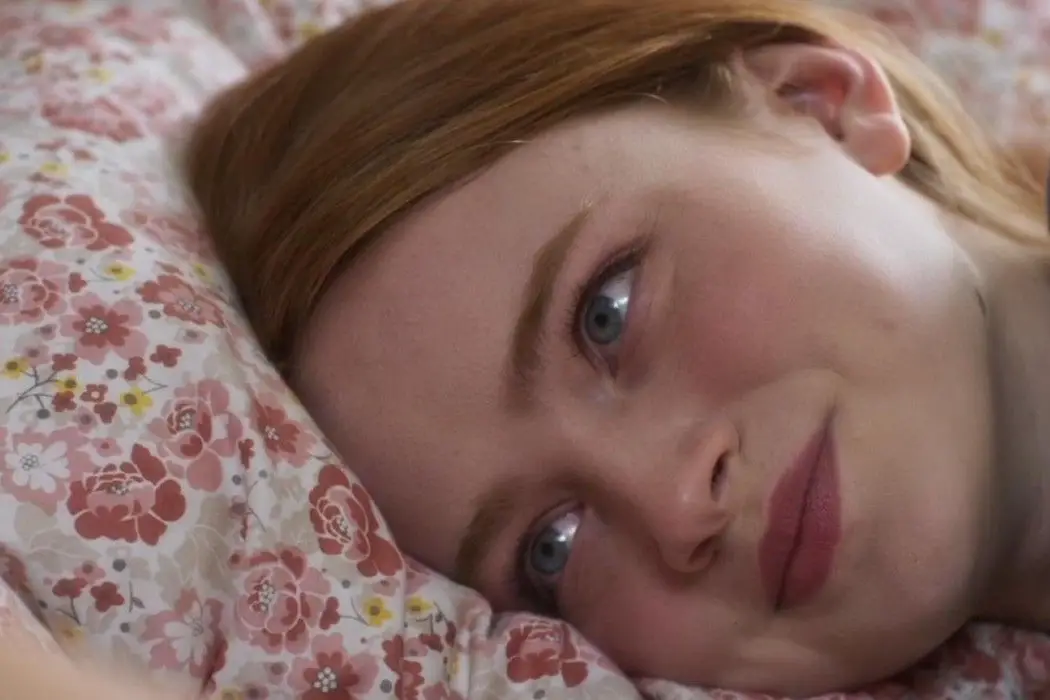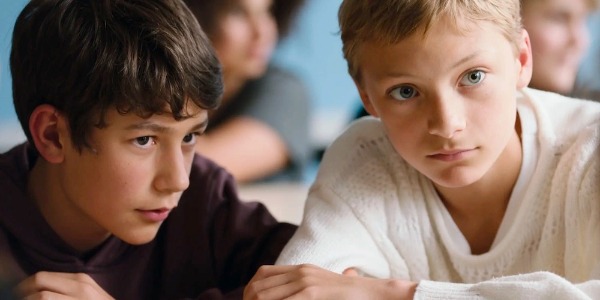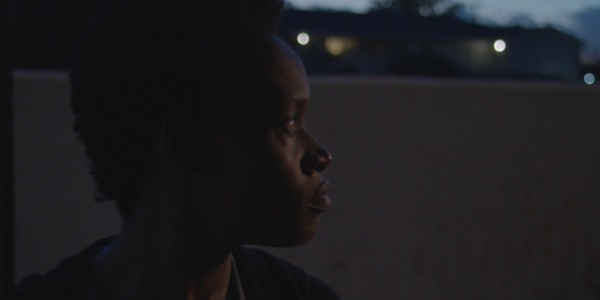Heartland International Film Festival 2022: CORSAGE, CLOSE, ME LITTLE ME & DEAR ZOE

Alex is a film addict, TV aficionado, and book lover.…
The 31st Heartland International Film Festival rolls on with more of their Cannes at the Kan-Kan selections, indies with big stars like Sadie Sink, and small gems. Here’s my second report from the festival.
Corsage (Marie Kreutzer)

The tightening of a corset is an old metaphor. Whether accurate to the garment’s use or not, the violent restriction of a woman’s body is used to signify social restriction as well, and with each pull you feel the forced expulsion of options. One usually sees it in contrast to the character’s desire to break free, as in Titanic and Portrait of a Lady on Fire and now Corsage.
The latest from writer/director Marie Kreutzer takes an imaginative look at the Empress Elisabeth of Austria as she turned 40 in the late 1800s. A spirited woman idolized for her beauty, and very interested in leading the life she wants instead of the life laid out for her, she chafes at every expectation but her own. She is vain, so the corset is a self-imposed restriction, but everything else that comes with life as a figure and not a leader has slowly driven her to a breaking point.
In its less careful moments, Corsage shows this by having Elisabeth visit an asylum and connect with the ladies being “treated” there. In its best moments, it allows star Vicky Krieps to squirm almost imperceptibly, a slight twist of the face being the only thing giving away her inner turmoil.
Mostly, though, Corsage is a meandering film, one that stands in stark contrast to Kreutzer’s vise-like previous film The Ground Beneath My Feet. Both are about powerful women, and both spend ample time taking in their minutia. But Kreutzer has fun here, taking advantage of an Empress’ ability to do as she pleases with most people to find moments of unexpected humor. That Krieps is asked to vacillate between these different modes, at once dismissing the people she’s forced to be around with a snarky aside and desperately clinging to the few who stir something, anything inside her makes this one of the more subtly complex roles of the year.
It’s one you have to look closely for, though, because while Krieps is at the film’s center she’s wandering through a year of the Empress’ life in a daze. It’s a difficult thing the film is attempting, to capture the nothingness of depression and have it come across as more than malaise. Yes, the Empress’ life is one of astounding privilege, and yes, she chooses some of the restrictions placed on her. But her existence has become untenable, and no amount of cream cake or adoration will fill the hole.
The greatest asset to getting this across, after Krieps’ assured central performance, is its flaunting of history in favor of its idea of the Empress as a caged figure. Here she’s an imperfect, occasionally hurtful, and perhaps not good person who still deserves more than her lot. Whether that’s true or not is irrelevant., because through this she becomes more than an Empress plucked out of time. Like Kreutzer has done before, she’s imagined a woman few of us are, but she’s found the elements that speak to all of our lives and thrown us in headfirst.
Close (Lukas Dhont)

Intimacy is worth going over with a fine-toothed comb, as is grief, as is forgiveness. All of these get touched on in Lukas Dhont’s small, measured tale of a boy in a situation far beyond his comprehension.
Léo and Rémi begin Close as best friends, perhaps in an unspoken way something more, spending their days in casual intimacy both emotional and physical. They lean close when they sit together, chastely share a bed, and are as present in each others homes as another family member. During summer isolation their bond exists easily, but when school starts their relationship is put under the cruel microscope of their fellow 13-year-olds. Rémi shrugs them off. Léo does not.
Throughout much is communicated wordlessly, with the camera’s intimate gaze being relied on over a verbose script. You’re expected to take in the subtle changes in the boys’ bodies to understand their division. Rémi, who isn’t bothered much by their classmate’s accusations, remains close and casual with Léo. Léo, who is cut deeper by the remarks, puts up a stiff guard to defend himself. Neither have the words to discuss the situation. Instead, Léo begins literally pushing Rémi away, the devastation of which leads to a terrible tragedy.
The film is always most interested in Léo, whose placid face belies the churn going on inside. Digging past that inscrutable exterior should be the reward for all this close observation, but the film falters because Dhont and co-writer Tijssens don’t find much there. Léo is devastated, of course, but it remains a vague sense of loss instead of an acute one. Everyone else the film lands on feels much the same, as if their surface has been mistaken for their depth. This uniformity indicates the actors aren’t at fault, who vary from the green (Eden Dambrine and Gustav De Waele as Léo and Rémi, respectively) to the seasoned (an astounding Émilie Dequenne as Rémi’s mother). All are game for the very physical acting this film requires, and moments work thanks to their beaten, buffeted bodies.
The best thread in the film is Léo’s assertion of masculinity, a knee-jerk response to the teasing of his classmates. When another boy goes on and on about hockey, he feigns interest in the macho sport. Suddenly he’s joined the team, strapping on pads and smashing into other boys in a much more accepted form of closeness that bring sly smiles to his face. Later, as more and more weight has been placed on him, the exercises take on a more violent tenor, and the bashing knocks loose everything bottled inside him. There’s truths there, simple but true, and even if they don’t dig as deep as the film’s aspirations, they are a small pleasure to behold. There’s just enough of those in Close to make it worthwhile.
Me Little Me (Elizabeth Ayiku)

The scale and concerns of Me Little Me is in its title. It’s about a lone woman, Mya, trying to get through a few stressful days, but from the outside you wouldn’t realize that the events were out of the ordinary. She goes to work, flirts with a bartender, and has a constant stream of dinner dates with friends. What Mya doesn’t tell anyone is that those dinner dates are part of her treatment program for an eating disorder, which she’s desperately relying on as she maneuvers into a new position at her job.
The interplay of these stressors proves to be a compelling driver, and the detailed attention each receives allows the film to build to a quiet cacophony. Of course her boss gives her a public and aggressive reprimand for not logging work properly. Of course the bartender becomes strangely cold after what she thought was a pleasant evening. And of course she gave the wrong paperwork to the treatment program and didn’t get the snack she wanted. It’s big and small things but they’re all at once, with no give in any area of her life.
All of this is played with quiet reserve by the excellent A’Keyah Dasia Williams, whose Mya tries to keep the disparate parts of her life separate. You can see the weight build up on her, though, through the way Williams carries her from crushing event to crushing event. Her emotion is always bottled, just barely below a clear register on Williams’ shoulders.
On occasion the film does get too absorbed in the details, particularly when pausing to go through the mechanics of Mya’s treatment. It’s a tricky balance because this is far from the usual representation of those recovering from an eating disorder, and there’s a palpable sense that reframing the disorders are one of the primary things the film wants to accomplish. For instance, the group Maya is apart of are all adults, mostly women but a couple men mixed in, and they seemingly come from every background imaginable. They decidedly aren’t the suburban, teenage white girls that are often shown, and they’re much farther along in their treatment than films usually go. You see plenty of journaling and reporting and approaches that most won’t be familiar with, and while this minutia is always intriguing, it can drag the film into a clinical tone that doesn’t match the rest of its slowly tightening screws.
When the film allows Mya to be front and center, not her treatment or her disorder, it is an absorbing character piece. All the rest of it is an excellent way to flesh out a character worthy of such close examination, but it doesn’t provide the film a beating heart and soul. Mya, luckily, proves to be an excellent one, and it’s impossible not to root for her as she navigates these trying days.
Dear Zoe (Gren Wells)

Accessible movies about difficult topics have their place, allowing people to explore experiences without being hammered by their effects in a rattling or upsetting way. They can still connect with emotional truths and provide the catharsis stories exist for as long as they remain honest within their comfortable boundaries. If they lean too far into the tricks of storytelling, though, they lose that honesty, and the whole thing becomes a painful regurgitation of tropes. Unfortunately, painful is the direction Dear Zoe goes in fairly quickly, and it never recovers.
The film opens by withholding. We see teenage Tess (Stranger Things star Sadie Sink) reflecting on the day her younger sister Zoe died. It happened to be September 11th, 2001, and it happened to lead to a lot of guilt for Tess (although the particulars of what happened and the veracity of her emotions remain unclear). What you do get is a lot of elliptical voiceover from Sink, ostensibly from the writing she’s doing as therapy, and yes, there’s a lot of ham-fisted connections being made between her family’s tragedy and the tragedy that befell the entire US that day.
If that sounds as painfully odd as the ending of that Robert Pattinson 9/11 movie, your instincts are correct. If it also brings to mind Sink’s arc on the last season of Stranger Things, you are also correct. Sink’s Tess is deep in her feelings about the loss of her sibling, but where Stranger Things gave her a monstrous metaphor for depression and suicidal ideation to fight, Dear Zoe gives her a deadbeat but loveable dad (Theo Rossi) and a rough around the edges love interest (Kweku Collins) to…mostly hang out with.
The odd thing about Dear Zoe is how much time you spend away from the inciting trauma. Tess runs away from her devastated mother and step-father pretty quickly, going to live with a dad she hasn’t seen in years but who steps up in an assured, mature way. It seems like a great scenario to be honest, and under his relatively chill roof Tess has the space and stability to process her grief. But even in that setup, a real teenage girl wouldn’t process everything cleanly, but Tess moves towards a healing truth with relative ease. I understand that this movie isn’t aiming to be a downer, nor is it going for a studious character study, but it strays so far from anything recognizable as human grief that you forget for long periods of time that Tess is struggling with anything.
What you get instead are rote outbursts of emotion, and they extend to characters beyond Tess. Her mother is barely able to get off the couch, her step-father has a face that never untwists, and even Collins’ Jimmy gets a sad story. The fever pitch of their suffering moves beyond melodrama and into cringe territory, even with game performances by all the actors involved, while Sink struggles to swing between Tess as a rebellious teen and Tess as an emotional mess on par with the rest of her family. Everything about the tone here is wildly off, so I assume that comes from unmeasured instruction by director Gren Wells. The story itself, with its laughable tie-in to 9/11, comes from the book of the same name on which this is based. Maybe it’s better integrated in the novel, but here it’s just another silly piece of a pretty ludicrous movie.
That’s it for my second report from the Heartland International Film Festival. Which of these movies do you want to see?
Does content like this matter to you?
Become a Member and support film journalism. Unlock access to all of Film Inquiry`s great articles. Join a community of like-minded readers who are passionate about cinema - get access to our private members Network, give back to independent filmmakers, and more.
Alex is a film addict, TV aficionado, and book lover. He's perfecting his cat dad energy.













